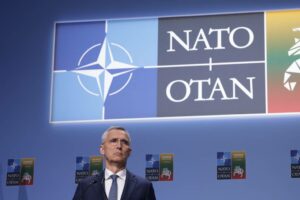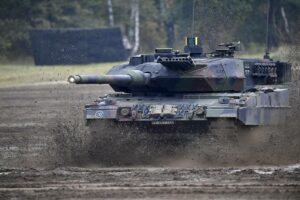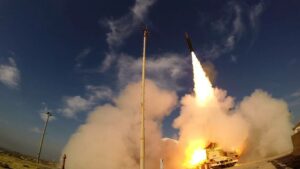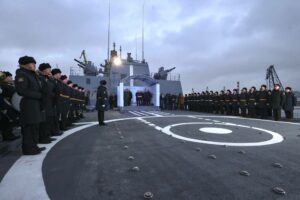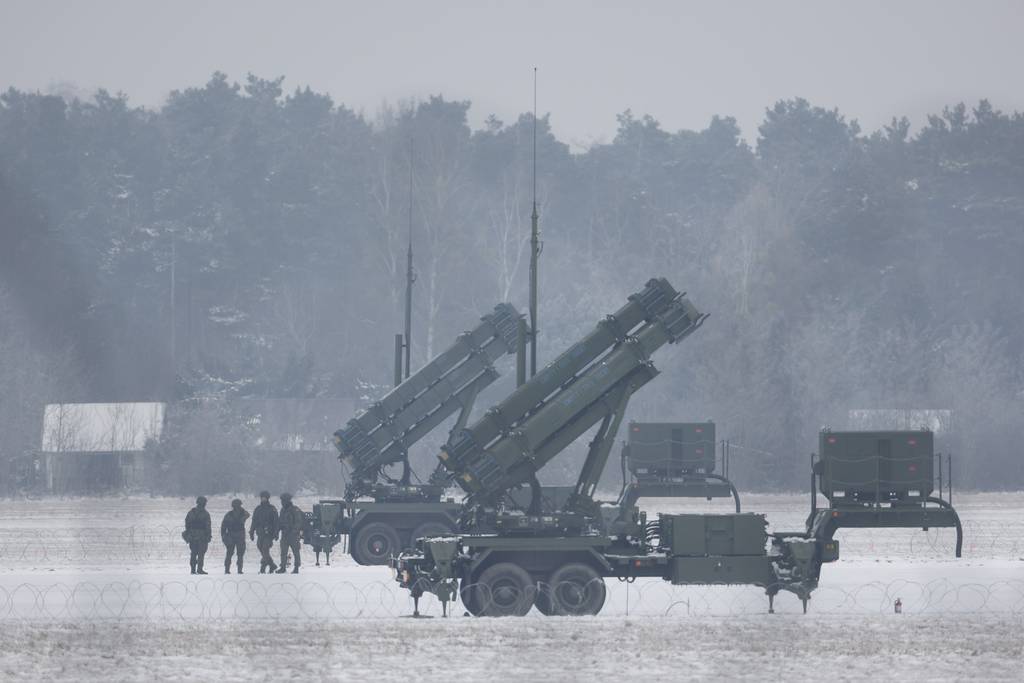
PARIS — Amid the rows of fighter aircraft, drones and helicopters at the Paris Air Show here last month, an uptick in the displays of one key class of ground-based systems stood out: the radars and launchers of missile defense.
Feted as the first “salon” hosted at Le Bourget Paris since the COVID-19 pandemic, the event was also the first such air show since Russia invaded Ukraine in February 2022. Since then, many of Kyiv’s neighbors and allies have rushed to donate air and missile defense systems and to take stock of their own inventories.
On the sidelines of the show, European officials met to discuss the continent’s varied proposals for developing new air and missile defense systems, with Germany leading a 17-nation-strong initiative to procure off-the-shelf capabilities, and France pushing for a smaller, organic approach to building up European industry.
French President Emmanuel Macron used the forum to argue against the Berlin-led Sky Shield effort, first announced by Chancellor Olaf Scholz in October 2022, which would bring together a combination of air and missile defense systems – procured from both European and non-European companies. Specifically, German officials have cited Raytheon’s Patriot system and the Arrow 3 system developed by Israel Aerospace Industries (IAI) as key components of the Sky Shield system.
Macron warned at his conference against relying on non-European systems and that an “Iron Dome”-like missile defense initiative, as Israel has it, could not work for the whole continent of Europe.
“When we talk air defense, we would be wrong to rush into capacity. The question is, first of all, strategic,” he said June 19 at the air show, speaking to representatives from 20 European nations as well as NATO.
“What Ukraine shows is we can only give Kyiv what we have and produce,” he continued. “What comes from non-European countries is less manageable. It is subject to timetables, priorities and sometimes even authorizations from third countries,” he added.
A recent report by the Washington, D.C.-based Center for Strategic and International Studies (CSIS) assessed that Europe’s militaries lack sufficient systems to counter long-range guided and unguided missiles, and while militaries possess a number of short- and medium-range systems, many are dated and originally of Soviet stock.
“Europe’s piecemeal approach to air and missile defense at the national level is no longer a sustainable strategy,” the report said.
Germany’s vision for the European Sky Shield Initiative (ESSI) would combine existing short-, medium-, and long-range air and missile defense systems coming from Europe, the United States, and Israel.
To date, 17 European nations have committed to supporting the endeavor, including Belgium, Bulgaria, the Czech Republic, Estonia, Finland, Hungary, Latvia, Lithuania, the Netherlands, Norway, Romania, Slovakia, Slovenia, Sweden and the United Kingdom. As of this article’s writing, France and Italy are unaffiliated, although German officials have asserted the door remains open for new members.
But the French president’s address at the air show left little doubt that Paris is not keen to sign onto Sky Shield. Macron used the forum to announce that the Franco-Italian-built SAMP/T missile defense system was officially delivered and operational in Ukraine, following deliveries in May. “It’s really Europe protecting Europe, and thus at the heart of our project,” he said.
He also announced a joint procurement by five European nations — France, Belgium, Cyprus, Estonia and Hungary — of Mistral 3 air defense missiles produced by weapons-maker MBDA. Some of those nations have also committed to the Sky Shield effort.
The French-led initiative will be overseen by the ministry’s procurement arm Direction Generale de l’Armement (DGA) on behalf of the partner nations. The total number of missiles to be ordered remains unconfirmed, although French defense officials stated on June 20 that it could be near 1,000.
MBDA did not respond to inquiries on how the missiles are to be divided between the participating nations or when the deliveries would begin. The production rate for the Mistral, which is currently 20 units per month, will climb by 40 percent – or 28 units per month – in 2024, a company spokesperson told Defense News in an email.
Other missile manufacturers at the show were eager for Germany’s effort to move forward. In June, lawmakers in Berlin gave the green light to approve an advance payment for the procurement of Arrow 3 components, as part of a deal that could reportedly total $4.3 billion.
In an interview with Defense News, IAI’s chief executive Boaz Levy hailed the move as “a step in the right direction” to be able to deliver the systems on time.
“Our goal currently is to finalize and have a contract signed before the end of the year to be able to deploy the first Arrow 3s to Germany by 2025,” Levy said.
He added that training would likely be a matter of “a few months,” with parts happening in Israel and Germany.
Levy advertised the system as complementary to Germany’s own defensive architecture. “The Arrow 3 will add another layer of protection and allow German forces to not only control their territory but also their allies and neighbors as it has a huge footprint,” he said.
The system boasts a two-stage interceptor capable of targeting missiles launched more than 2,000 kilometers away.
Since the news first broke last year that Germany was considering the Arrow 3 system, with the country’s air force as a key proponent, experts have debated how difficult it would be to integrate a non-NATO system with European equipment.
Vivienne Machi is a reporter based in Stuttgart, Germany, contributing to Defense News' European coverage. She previously reported for National Defense Magazine, Defense Daily, Via Satellite, Foreign Policy and the Dayton Daily News. She was named the Defence Media Awards' best young defense journalist in 2020.
Elisabeth Gosselin-Malo is a Europe correspondent for Defense News. She covers a wide range of topics related to military procurement and international security, and specializes in reporting on the aviation sector. She is based in Milan, Italy.
- SEO Powered Content & PR Distribution. Get Amplified Today.
- PlatoData.Network Vertical Generative Ai. Empower Yourself. Access Here.
- PlatoAiStream. Web3 Intelligence. Knowledge Amplified. Access Here.
- PlatoESG. Automotive / EVs, Carbon, CleanTech, Energy, Environment, Solar, Waste Management. Access Here.
- BlockOffsets. Modernizing Environmental Offset Ownership. Access Here.
- Source: https://www.defensenews.com/global/europe/2023/07/03/europes-defense-leaders-push-competing-air-defense-visions/
- :has
- :is
- :not
- $UP
- 000
- 1
- 17
- 19
- 20
- 2020
- 2022
- 2024
- 2025
- 28
- 40
- 70
- a
- Able
- add
- added
- address
- advance
- Aerospace
- against
- AIR
- Air Force
- aircraft
- All
- allow
- also
- Although
- Amid
- an
- and
- Announce
- announced
- Another
- approach
- approve
- architecture
- ARE
- argue
- ARM
- AS
- At
- aviation
- awards
- away
- based
- BE
- before
- begin
- behalf
- Belgium
- berlin
- BEST
- between
- Billion
- boasts
- both
- bring
- Broke
- Building
- Bulgaria
- but
- by
- CAN
- capabilities
- capable
- Capacity
- Center
- chancellor Olaf Scholz
- chief
- cited
- class
- climb
- combination
- combine
- comes
- coming
- committed
- Companies
- company
- competing
- complementary
- components
- Conference
- considering
- continent
- continued
- contract
- contributing
- control
- could
- Counter
- countries
- country’s
- coverage
- covers
- COVID-19
- COVID-19 pandemic
- Currently
- Cyprus
- Czech
- czech republic
- daily
- Daily news
- Date
- dated
- deal
- defence
- Defense
- defensive
- deliver
- delivered
- Deliveries
- deploy
- developed
- developing
- DID
- difficult
- direction
- discuss
- displays
- divided
- donate
- Door
- doubt
- Drones
- eager
- effort
- Emmanuel Macron
- end
- endeavor
- equipment
- estonia
- Europe
- European
- Europes
- Even
- Event
- executive
- existing
- experts
- February
- few
- finalize
- Finland
- First
- five
- following
- Footprint
- For
- Force
- Forces
- foreign
- foreign policy
- Forum
- Forward
- France
- French
- from
- German
- Germany
- Give
- goal
- Green
- green light
- Happening
- Have
- he
- Heart
- helicopters
- here
- his
- hosted
- How
- HTTPS
- huge
- Hungary
- images
- in
- Including
- industries
- industry
- Initiative
- Inquiries
- integrate
- International
- Interview
- into
- Israel
- IT
- Italy
- joint
- journalist
- jpg
- june
- Keen
- Key
- Kingdom
- Lack
- Last
- LATVIA
- launched
- lawmakers
- layer
- leaders
- leading
- left
- less
- Level
- light
- likely
- Lithuania
- little
- longer
- machi
- magazine
- Manufacturers
- many
- Matter
- May..
- Media
- Members
- met
- MILAN
- militaries
- Military
- missiles
- Month
- months
- more
- move
- move forward
- Named
- National
- Nations
- Near
- neighbors
- Netherlands
- New
- news
- no
- Norway
- number
- october
- of
- Officially
- officials
- on
- ONE
- only
- open
- operational
- or
- organic
- originally
- our
- out
- own
- pandemic
- paris
- part
- participating
- partner
- parts
- payment
- per
- percent
- plato
- Plato Data Intelligence
- PlatoData
- policy
- possess
- president
- previously
- procurement
- produce
- Produced
- Production
- project
- proponent
- Proposals
- protecting
- protection
- Push
- Pushing
- question
- range
- Rate
- really
- recent
- related
- relying
- remains
- report
- Reported
- reporter
- Reporting
- Representatives
- Republic
- Respond
- right
- Romania
- rush
- Russia
- Said
- satellite
- sector
- security
- she
- Shield
- show
- Shows
- sign
- signed
- since
- sky
- Slovenia
- smaller
- some
- speaking
- specializes
- specifically
- spokesperson
- stated
- States
- Step
- stock
- Strategic
- Strategy
- studies
- subject
- such
- sufficient
- Supporting
- sustainable
- Sweden
- system
- Systems
- Take
- Talk
- targeting
- territory
- than
- that
- The
- the Netherlands
- the United Kingdom
- their
- then
- Third
- third countries
- this
- those
- time
- to
- together
- Topics
- Total
- Training
- Ukraine
- United
- United Kingdom
- United States
- units
- used
- via
- vision
- visions
- was
- washington
- we
- WELL
- were
- What
- when
- which
- while
- whole
- wide
- Wide range
- will
- with
- Work
- would
- writing
- Wrong
- year
- young
- zephyrnet




